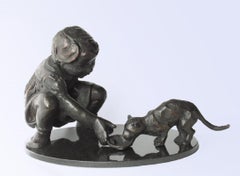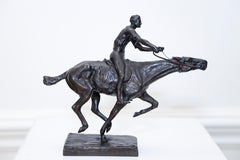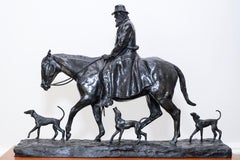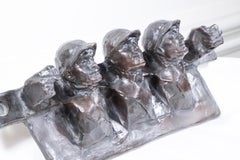Impressionist Sculptures
Emerging in 19th-century France, Impressionist art embraced loose brushwork and plein-air painting to respond to the movement of daily life. Although the pioneers of the Impressionist movement — Claude Monet, Edgar Degas, Paul Cézanne, Berthe Morisot, Camille Pissarro, and Pierre-Auguste Renoir — are now household names, their work was a radical break with an art scene led and shaped by academic traditions for around two centuries. These academies had oversight of a curriculum that emphasized formal drawing, painting and sculpting techniques and historical themes.
The French Impressionists were influenced by a group of artists known as the Barbizon School, who painted what they witnessed in nature. The rejection of pieces by these artists and the later Impressionists from the salons culminated in a watershed 1874 exhibition in Paris that was staged outside of the juried systems. After a work of Monet’s was derided by a critic as an unfinished “impression,” the term was taken as a celebration of their shared interest in capturing fleeting moments as subject matter, whether the shifting weather on rural landscapes or the frenzy of an urban crowd. Rather than the exacting realism of the academic tradition, Impressionist paintings, sculptures, prints and drawings represented how an artist saw a world in motion.
Many Impressionist painters were inspired by the perspectives in imported Japanese prints alongside these shifts in European painting — Édouard Manet drew on ukiyo-e woodblock prints and depicted Japanese design in his Portrait of Émile Zola, for example. American artists such as Mary Cassatt and William Merritt Chase, who studied abroad, were impacted by the work of the French artists, and by the late 19th century American Impressionism had its own distinct aesthetics with painters responding to the rapid modernization of cities through quickly created works that were vivid with color and light.
Find a collection of authentic Impressionist art on 1stDibs.
Early 2000s Impressionist Sculptures
Bronze
1910s Impressionist Sculptures
Bronze
1910s Impressionist Sculptures
Bronze
1910s Impressionist Sculptures
Bronze
2010s Impressionist Sculptures
Metal
2010s Impressionist Sculptures
Metal
2010s Impressionist Sculptures
Metal
2010s Impressionist Sculptures
Metal
2010s Impressionist Sculptures
Stone
Early 2000s Impressionist Sculptures
Bronze
21st Century and Contemporary Impressionist Sculptures
Wood, Wood Panel
2010s Impressionist Sculptures
Stone
2010s Impressionist Sculptures
Stone
2010s Impressionist Sculptures
Stone
Early 1900s Impressionist Sculptures
Linen, Oil, Wood
2010s Impressionist Sculptures
Stone
2010s Impressionist Sculptures
Stone
2010s Impressionist Sculptures
Metal
Late 20th Century Impressionist Sculptures
Bronze
2010s Impressionist Sculptures
Bronze
1980s Impressionist Sculptures
Bronze
1980s Impressionist Sculptures
Bronze
Mid-20th Century Impressionist Sculptures
Wood, Paint
Mid-20th Century Impressionist Sculptures
Wood, Paint
Mid-20th Century Impressionist Sculptures
Wood, Paint
Mid-20th Century Impressionist Sculptures
Wood, Paint
Mid-20th Century Impressionist Sculptures
Wood, Paint
Mid-20th Century Impressionist Sculptures
Wood, Paint
Mid-20th Century Impressionist Sculptures
Wood, Paint
Mid-20th Century Impressionist Sculptures
Wood, Paint
Early 2000s Impressionist Sculptures
Bronze
2010s Impressionist Sculptures
Bronze
2010s Impressionist Sculptures
Bronze
2010s Impressionist Sculptures
Bronze
1870s Impressionist Sculptures
Bronze
2010s Impressionist Sculptures
Bronze
Early 20th Century Impressionist Sculptures
Marble, Bronze
Mid-20th Century Impressionist Sculptures
Paint, Wood
2010s Impressionist Sculptures
Bronze
2010s Impressionist Sculptures
Bronze
2010s Impressionist Sculptures
Bronze
2010s Impressionist Sculptures
Bronze
Mid-20th Century Impressionist Sculptures
Bronze
2010s Impressionist Sculptures
Porcelain, Glaze, Crayon, Watercolor
2010s Impressionist Sculptures
Stone
2010s Impressionist Sculptures
Stone
2010s Impressionist Sculptures
Bronze
2010s Impressionist Sculptures
Bronze
2010s Impressionist Sculptures
Bronze
2010s Impressionist Sculptures
Stone
2010s Impressionist Sculptures
Stone
2010s Impressionist Sculptures
Stone
1880s Impressionist Sculptures
Bronze
2010s Impressionist Sculptures
Stone
2010s Impressionist Sculptures
Stone
2010s Impressionist Sculptures
Stone
2010s Impressionist Sculptures
Stone
2010s Impressionist Sculptures
Stone



